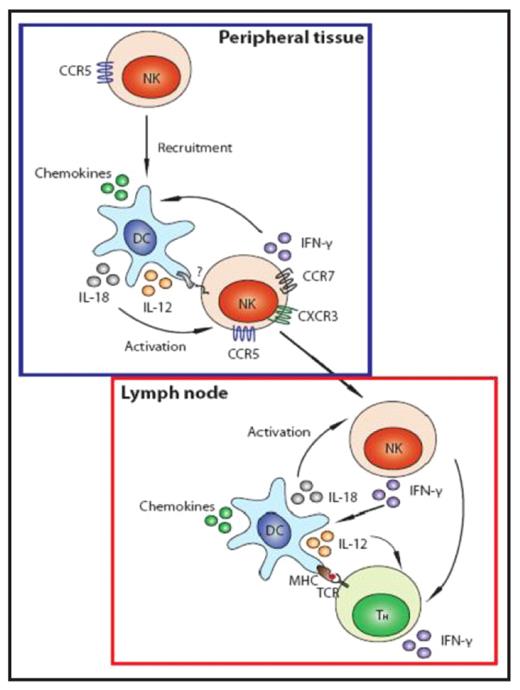Abstract
Besides their prominent role in the destruction of altered self-cells, natural killer (NK) cells have been shown to potentiate T cell responses by interacting with dendritic cells (DC). In mouse models as well as in a recent human study it has been demonstrated that DC might activate NK cells. In the context of dendritic cell-based vaccines – i.e. optimising the optimal maturation cocktail - it remains to be determined if and how NK-DC interactions depend on differential DC maturation and what factors influence the NK activation.. By comparing differential DC differentiation (IL-4/GM-CSF and IL-13/GMCSF) and maturation cocktails (IFN-γ/FMKp and PGE2/TNF-α), we show that the ability of human DCs to attract NK cells is imprinted during DC maturation. Only FMKP/IFN-γ (stimulation Toll like receptor 2 and 4) maturated DCs have the capacity to actively recruit NK cells in vitro and our data indicate that CCR5 is the dominant chemokine receptor in this recruitment (Figure 1). Furthermore, in contrast to PGE2/TNF-α matured DC, FMKP/IFN-γ maturated DCs activate NK cells to produce IFN-γ in a IL-12/IL18 dependent manner, of which we show it contributes to strong TH1 polarization. In addition upon contact with these DCs NK cells upregulate their lymph node homing receptors, possibly inducing secondary migration to the lymph nodes.
In conclusion, besides the identification of a superior DC maturation cocktail which contributes to NK-DC interactions, we identified a novel recruitment mechanism for peripheral human NK cells which may contribute to secondary, central DC-NK interactions and strong TH1 polarization.
Disclosures: No relevant conflicts of interest to declare.
Author notes
Corresponding author


This feature is available to Subscribers Only
Sign In or Create an Account Close Modal